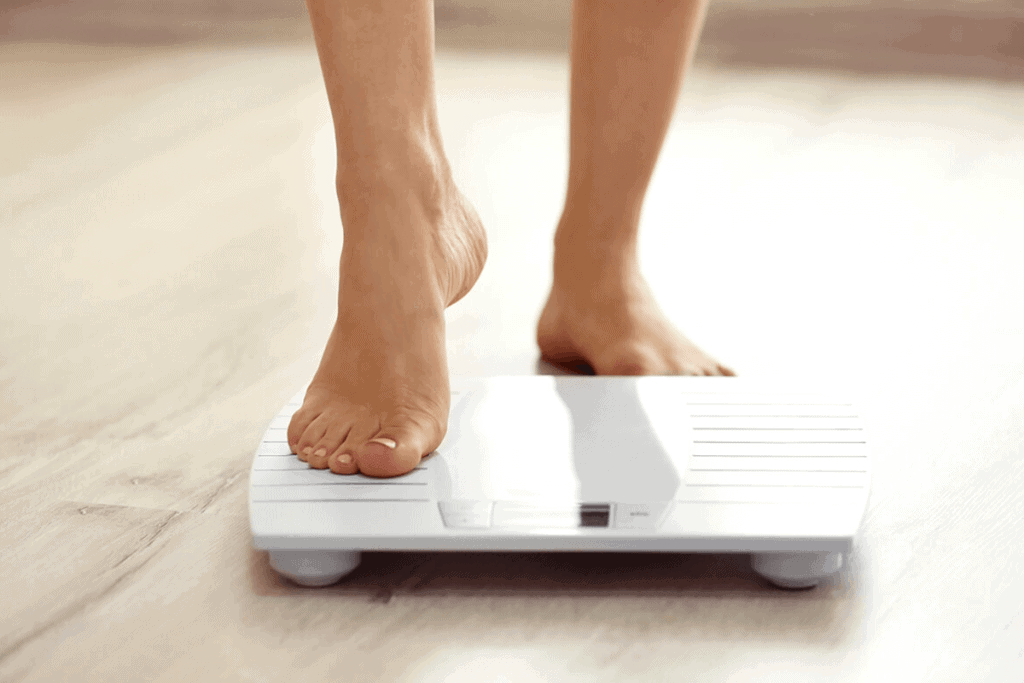
Can hormones really cause weight gain?
Hormones are chemical messengers that are secreted by various glands in the endocrine system. These messengers travel through your bloodstream to targeted cells and organs and tell them how to function. (1) Your hormones directly influence everything from your mood to your blood pressure to the amount of calcium in your bones. Some hormones can also have a profound effect on your weight by regulating your metabolism, appetite, and insulin levels. (2) But when your hormones are out of balance, it leads to unwanted weight gain. Hormonal weight gain doesn’t just change the way you look, it may also contribute to a variety of health problems such as cardiovascular disease, dementia, and several types of cancer. (3)(4)(5) One reason is that body fat, especially visceral fat, is metabolically active and can create hormones and chemical messengers that cause inflammation and other ill effects. (6) For example, older overweight women can produce excess estrogen in their fatty (adipose) tissue. And this can increase their risk of developing breast cancer. (7)Did you know? Certain hormones like cortisol help control the balance between salt and water. High cortisol levels—often a result of chronic stress—can lead to fluid retention and water weight gain. (8)
4 hormones that cause weight gain
If you are struggling with excess weight that simply won’t budge, it may be time to focus on the following four hormones. Consider talking to your doctor, nutritionist, or naturopath about testing to see if a hormonal imbalance may be at the root of your weight gain.
1. Cortisol
Often called the “stress hormone,” cortisol is a steroid hormone made in the adrenal glands and released during the fight or flight reaction. But cortisol doesn’t just help you survive real or perceived dangers. It also plays a key role in controlling blood sugar levels and regulating your metabolism. (9)(10) If you suffer from chronic stress—as many of us do—it can cause a steady stream of cortisol to flood the body, as well as a heightened response to the hormone. This can make us more vulnerable to coping mechanisms like stress-eating which can lead to weight gain. (11)2. Estrogen
Menopausal women everywhere know that when estrogen levels drop, weight rises. Estrogen is the most important female sex hormone and is responsible for promoting fat storage during a woman’s reproductive years to maintain fertility and support a healthy pregnancy. (12) During menopause, however, the ovaries produce decreasing amounts of estrogen. As a result, fat storage shifts from subcutaneous fat in the hips and thighs to stubborn visceral fat in the abdomen. (13)3. Insulin
Insulin is an essential hormone produced in the pancreas that moves sugar, or glucose, into your cells. Your cells can then use this sugar for energy. Insulin is also the main fat storage hormone in the body. It tells your cells to store fat and then prevents this stored fat from being broken down. (14) A diet high in ultra-processed foods can cause chronically elevated insulin levels or frequent spikes in insulin. (15) This can result in insulin resistance and weight gain, especially around the belly area. (16) Worse still, the more weight you gain, the more insulin resistant you become.4. Thyroid hormones
Your thyroid is a small butterfly-shaped gland that sits at the base of your throat. Its excretes two primary hormones: triiodothyronine, known as T3, and thyroxine, known as T4. Under normal circumstances, T3 is converted to the more active T4 as needed to regulate your metabolic rate and turn calories and oxygen into energy. (17) Low levels of these hormones—a condition called hypothyroidism—or glitches in this conversion process, have been shown to cause weight gain, along with a slew of other symptoms. (18)(19)
How to lose hormonal weight
When traditional low-calorie diets and increased exercise don’t drive the number on your bathroom scale down, these lifestyle changes may help re-balance your hormones and trigger weight loss. As a bonus, these simple tweaks support overall health and wellbeing.
- Limit your intake of sugar and refined carbohydrates (20)
- Drink alcohol in moderation (21)
- Increase your consumption of organic fruits and vegetables (22)
- Eat sufficient amounts of high-quality protein (23)
- Strive for seven to nine hours of high quality sleep each night (24)
- Get regular amounts of moderate aerobic exercise (25)
- Be aware of your stress triggers (26)
- Practice yoga, meditation, or other relaxation techniques (27)(28)
- Switch to natural household cleaners and personal care products free from hormone-disrupting chemicals (29)
- Choose glass over plastic food storage containers to limit exposure to environmental estrogens (30)
Did you know? Studies suggest that exposure to the hormone-disrupting chemicals in air pollution can increase your risk for weight gain (31)(32)
Best supplements for hormonal imbalance
Ashwagandha
This adaptogen improves the body’s resistance to chronic stress thanks to special plant chemicals known as withanolides. Withanolides serve as important hormone precursors that morph into usable human hormones when needed. (33) Because of this ability, ashwagandha modulates the way hormones function during times of stress, reducing stress-eating and the hormonal effects of cortisol. (34)

Fish oil
The omega-3 fatty acids found in fish oil are essential components of every cell in the body. They are also critical for hormonal balance because they are used in hormone production and function. (35) Additionally, omega-3s are very effective against inflammation, which often accompanies hormonal weight gain. (36) One specific type of omega-3 known as eicosapentaenoic acid or EPA appears to have a particularly beneficial effect on the accumulation of body fat and how well the body processes glucose. (37) Taken together, these actions may help with weight loss efforts.Vitamin D
People who are overweight tend to have lower vitamin D levels. They are also more prone to suffer from insulin resistance. (38) But some evidence suggests that reversing these low levels with supplemental vitamin D could spur the loss of body fat and enhance weight loss. In one 12-month study, 218 overweight women took part in a supervised low-calorie diet and exercise program. Half of the women were randomized to a vitamin D supplement and the other half received a placebo. After a year, those taking the supplement lost an average of seven pounds more than those taking the placebo. (39) One reason for this result may be due to the sunshine vitamin’s ability to reduce body fat mass. (40) Adequate vitamin D levels might also help with long-term weight maintenance. (41)The bottom line
Losing weight is hard. When key hormones are out of whack, it can be even harder. Combining hormone-balancing supplements with weight-specific lifestyle hacks might give you the edge you need to overcome underlying hormonal problems that can stall weight loss.- Morley JE. Endocrine Function. Merck Manual Consumer Version. Available at: https://www.merckmanuals.com/home/hormonal-and-metabolic-disorders/biology-of-the-endocrine-system/endocrine-function
- Schwartz NA, Rhett Rigby B, Le Bounty P, et al. A review of weight control strategies and their effects on the regulation of hormonal balance. J Nutr Metab. 2011;2011:237932.
- Rosano GM, Vitale C, Marazzi G, et al. Menopaue and cardiovascular disease: the evidene. Climacteric. 2007;10 Suppl 1:19-24.
- Gustafson D, Rothenberg E, Blennow K, et al. An 18-year follow-up of overweight and risk of Alzheimer disease. Arch Intern Med. 2003;163(13):1524-8.
- Keum N, Greenwood DC, Lee DH, et al. Adult weight gain and adiposity-related cancers: a dose-response meta-analysis of prospective observational studies. J Natl Cancer Inst. 2015;107(2).
- Donohoe CL, Doyle SL, Reynolds JV. Visceral adiposity, insulin resistance, and cancer risk. Diabetol Metabol Synd. 2011;3:12.
- Gérard C, Brown KA. Obesity and breast cancer—Role of estrogens and the molecular underpinnings of aromatase regulation in breast adipose tissue. Mol Cell Endocrinol. 2018;466:15-30.
- Dugué B, Leppänen EA, Teppo AM, et al. Effects of psychological stress on plasma interleukins-1 beta and 6, C-reactive protein, tumour necrosis factor alpha, anti-diuretic hormone, and serum cortisol. Scand J Clin Lab Invest. 1993;53(6):555-61.
- Konishi S, O’Connor KA. Salivary but not blood cortisol excretion is associated with metabolic biomarkers in healthy young women. Am J Hum Biol. 2016;28(4):539-44.
- What is Cortisol? Hormone Health Network. The Endocrine Society. Available at: https://www.hormone.org/your-health-and-hormones/glands-and-hormones-a-to-z/hormones/cortisol
- Hewagalamulage SD, Lee TK, Clarke IJ, et al. Stress, cortisol, and obesity: a role for cortisol responsiveness in identifying individuals prone to obesity. Domest Anim Endocrinol. 2016;56 Suppl:S112-20.
- Pedersen SB, Kristensen K, Hermann PA, et al. Estrogen controls lipolysis by up-regulating alpha2A-adrenergic receptors directly in human adipose tissue through the estrogen receptor alpha. Implication for the female fat distribution. J Clin Endocrinol Metab. 2004;89(4):1869-78.
- Lovejoy JC. The influence of sex hormones on obesity across the female life span. J Womens Health. 1998;7(10):1247-56.
- NIH study shows how insulin stimulates fat cells to take in glucose. National Institutes of Health. 2010. Available at: https://www.nih.gov/news-events/news-releases/nih-study-shows-how-insulin-stimulates-fat-cells-take-glucose
- Isganaitis E, Lustig RH. Fast food, central nervous system insulin resistance, and obesity. Arterioscler Thromb Vasc Biol. 2005;25(12):2451-62.
- Carey DG, Jenkins AB, Campbell LV, et al. Abdominal fat and insulin resistance in normal and overweight women: Direct measurements reveal a strong relationship in subjects at both low and high risk of NIDDM. Diabetes. 1996;45(5):633-8.
- Thyroid Gland. You and Your Hormones. Society of Endocrinology. Available at: https://www.yourhormones.info/glands/thyroid-gland/
- Chaker L, Bianco AC, Jonklaas J, et al. Hypothyroidism. Lancet. 2017;390(10101):1550-62.
- Sanyal D, Raychaudhum M. Hypothyroidism and obesity: An intriguing link. Indian J Endocrinol Metab. 2016;20(4):554-7.
- Ebbeling CB, Feldman HA, Klein GL, et al. Effects of a low carbohydrate diet on energy expenditure during weight maintenance: randomized trial. BMJ. 2018;363:k4583.
- Rachdaoui N, Sarkar DK. Pathophysiology of the effects of alcohol abuse on the endocrine system. Alcohol Res. 2017;38(2):255-76.
- Janesick AS, Blumberg B. Obesogens: an emerging threat to public health. Am J Obstet Gynecol. 2016;214(5):559-65.
- Jahan-Mihan A, Luhovvy BL, El Khoury D, et al. Dietary proteins as determinants of metabolic and physiologic functions of the gastrointestinal tract. Nutrients. 2011;3(5):574-603.
- Spiegel K, Leproult R, Van Cauter E. Impact of sleep debt on metabolic and endocrine function. Lancet. 1999;354(9188):1435-9.
- Morville T, Sahl RE, Tammell SAJ, et al. Divergent effects of resistance and endurance exercise on plasma bile acids, FGF19, and FGF21 in humans. JCI Insight, 2018; 3 (15).
- Harris RB. Chronic and acute effects of stress on energy balance: are there appropriate animal models? Am J Physiol Regul Integr Comp Physiol. 2015;308(4):R250-65.
- Nilakanthan S, Metri K, Raghuram N, et al. Effect of 6 months intense yoga practice on lipid profile, thyroxine medication, and serum TSH level in women suffering from hypothyroidism: A pilot study. J Complement Integra Med. 2016;13(2):189-93.
- Turakitwanakan W, Mekseepralard C, Busarakumtragul P. Effects of mindfulness meditation on serum cortisol of medical students. J Med Assoc Thai. 2013;96 Suppl 1:S90-5.
- Wong KH, Durrani TS. Exposures to endocrine disrupting chemicals in consumer products—a guide for pediatricians. Curr Probl Pediatr Adolesc Health Care. 2017;47(5):107-18.
- Moreira MA, André LC, Cardeal ZL. Analysis of phthalate migration to food simulants in plastic containers during microwave operations. Int J Environ Res Public Health. 2013;11(1):507-26.
- Darbre PD. Overview of air pollution and endocrine disorders. Int J Gen Med. 2018;11:191-207.
- de Bont J, Casas M, Barrera-Gómez J, Cirach M, et al. Ambian air pollution and overweight and obesity in school-aged children in Barcelona, Spain. Environ Int. 2019;125:58-64.
- Monograph. Withania somnifera. Altern Med Rev. 2004;9(2):211-4.
- Choudhary D, Bhattacharyva S, Joshi K. Body weight management in adults under chronic stress through treatment with ashwagandha root extract: A double-blind, randomized, placebo-controlled trial. J Evid Based Complementary Altern Med. 2017;22(1):96-106.
- Omega-3 fatty acids: An essential contribution. The Nutrition Source. Harvard TH Chan School of Public Health. Available at: https://www.hsph.harvard.edu/nutritionsource/what-should-you-eat/fats-and-cholesterol/types-of-fat/omega-3-fats/
- Calder PC. Omega-3 fatty acids and inflammatory processes. Nutrients. 2010;2(3):355-74.
- Pinel A, Pitois E, Rigaudiere JP, et al. EPA prevents fat mass expansion and metabolic disturbances in mice fed with a Western diet. J Lipid Res. 2016;57(8):1382-97.
- Szymczak-Pajor I, Sliwinska A. Analysis of association between vitamin D deficiency and insulin resistance. Nutrients.2019;11(4).
- Mason C, Xiao L, Imayama I, et al. Vitamin D3 supplementation during weight loss: a double-blind randomized controlled trial. Am J Clin Nutr. 2014;99(5):1015-25.
- Salehpour A, Hosseinpanah F, Shidfar F, et al. A 12-week double-blind randomized clinical trial of vitamin D supplementation on body fat mass in healthy overweight and obese women. Nutr J. 2012;11:78.
- LeBlanc ES, Rizzo JH, Pedula KL, et al. Association between 25-hyroxyvitamin D and weight gain in elderly women. J Women’s Health. 2012;21(10):1066-73.





